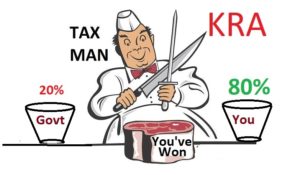The Kenya Revenue Authority (KRA) has reportedly lost its court case to collect billions of Kenyan Shillings from betting companies for the timeframe between 2018 and 2019. This is because the Judge presiding over the case ruled that tax on winnings during that time, did not involve the amount used to wager.

According to reports the Kenya Revenue Authority (KRA) had intended to tax both the amount wagered and the amount that had been won as Winnings. The High Court Judge; David Majanja stated that the Kenya Revenue Authority (KRA) was not clear because the definition of Winnings had not been stated in law at the time.
The Kenya Revenue Authority (KRA) had first slammed the betting companies Betika, Betin and SportPesa with notices to pay billions of Kenyan Shillings in taxes which it believed were due. It in addition, froze the bank accounts of said companies and shut down the trading accounts that each of the betting companies had set up on Safaricom’s M-Pesa mobile money platform. This resulted in Betin stopping their operations in Kenya completely.
Justice David Majanja upheld the same decision reached by the Tax Appeals Tribunal back in 2019 where it stated that the Kenya Revenue Authority (KRA) could not carry out any collection of withholding tax that should have first been deducted by it; the Kenya Revenue Authority (KRA) from the gamblers directly.
Read Also: KRA Collects 476.6 Billion Kenyan Shillings In Q1 Of 2021/22
In the words of the High Court Judge; David Majanja, “Consequently, I, therefore, find and hold that during the subject years of 2018 and 2019, the [KRA] commissioner could not collect the withholding tax that ought to have been deducted by the Respondents from the punters and that all the commissioner could do was seek the same from the punters directly.”

In June of 2019 the Kenya Revenue Authority (KRA) alleged that Betika owed 1.7 billion Kenyan Shillings in taxes. The Kenya Revenue Authority (KRA) stated that the amount in question was owed on account of the twenty (20) percent withholding tax on winnings which had newly been introduced.
The betting companies however, refused to oblige the payment demands making it known that the Kenya Revenue Authority (KRA) had made a mistake in its interpretation that winnings included the initial stakes placed by the gamblers.
The Tax Appeals Tribunal during its ruling made it known that Winnings as explained in the Income Tax Act, referred to the payouts made by the betting companies and did not include the amounts staked by the Punters or Gamblers.
Before 2018 all winnings from betting and gaming in Kenya were not charged as Income. The Kenyan Parliament however, carried out amendments to the tax laws and subsequently stipulated that Winnings were the differences between the payouts made and the stakes placed every month for each player, and that was payable to the Gamblers by the Bookmakers.
Read Also: KRA Loses 5.6 Billion Kenyan Shilling Case Against Coca-Cola Bottlers
Additional amendments stated that Winnings should now be considered as income from management or professional fees, interests, royalties, as well as rents. As a result, a twenty (20) percent tax was imposed on winnings.

The High Court Judge; David Majanja discovered that the law at the time did not outline or state what qualified as winnings and how said winnings would be computed.
The Judge stated that, “In the case of such ambiguity, the interpretation and resolution must be in the taxpayer’s favour.”
According to the High Court Judge; David Majanja, if the Kenyan Parliament intended for the definition of Winnings to include both the profit made and the wager itself, it would have made that very clear.
In the year which ended in March of 2022 individuals in Kenya spent a total of 169.1 billion Kenyan Shillings via Safaricom’s M-Pesa mobile money service on the placing of bets alone. This is an indication of the betting frenzy that has gradually spread nationwide.
Information from the telecommunications giant; Safaricom revealed that the value of bets increased by 23.8 percent from the 136 billion Kenyan Shillings which was the case the year earlier and proof that the crackdown by the Kenyan government on betting via the levying of higher taxes both on the gamblers and the betting companies.
Read Also: KRA Set To Limit Filing Nil Tax Returns
Betting specifically sports betting, has become quite popular among the youth in Kenya with a number of them using multiple loans from digital lenders and banks to fund their gambling habits
How informative was this article? Are there any other news topics, categories, or How To topics, that you would like us to write on? Feel free to reach out to Nexbit KE in the comment section.


